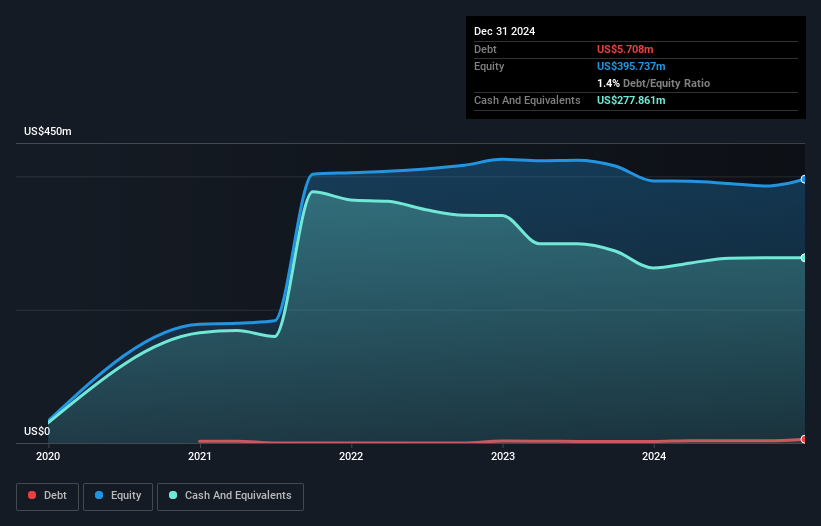Is Cytek Biosciences (NASDAQ:CTKB) Using Too Much Debt?
Some say volatility, rather than debt, is the best way to think about risk as an investor, but Warren Buffett famously said that 'Volatility is far from synonymous with risk.' So it might be obvious that you need to consider debt, when you think about how risky any given stock is, because too much debt can sink a company. We can see that Cytek Biosciences, Inc. (NASDAQ:CTKB) does use debt in its business. But the real question is whether this debt is making the company risky.
We check all companies for important risks. See what we found for Cytek Biosciences in our free report.What Risk Does Debt Bring?
Debt assists a business until the business has trouble paying it off, either with new capital or with free cash flow. Ultimately, if the company can't fulfill its legal obligations to repay debt, shareholders could walk away with nothing. However, a more usual (but still expensive) situation is where a company must dilute shareholders at a cheap share price simply to get debt under control. Of course, plenty of companies use debt to fund growth, without any negative consequences. When we examine debt levels, we first consider both cash and debt levels, together.
What Is Cytek Biosciences's Debt?
You can click the graphic below for the historical numbers, but it shows that as of December 2024 Cytek Biosciences had US$5.71m of debt, an increase on US$2.21m, over one year. But it also has US$277.9m in cash to offset that, meaning it has US$272.2m net cash.

How Healthy Is Cytek Biosciences' Balance Sheet?
According to the last reported balance sheet, Cytek Biosciences had liabilities of US$67.7m due within 12 months, and liabilities of US$36.1m due beyond 12 months. Offsetting this, it had US$277.9m in cash and US$60.6m in receivables that were due within 12 months. So it can boast US$234.7m more liquid assets than total liabilities.
This luscious liquidity implies that Cytek Biosciences' balance sheet is sturdy like a giant sequoia tree. On this view, lenders should feel as safe as the beloved of a black-belt karate master. Succinctly put, Cytek Biosciences boasts net cash, so it's fair to say it does not have a heavy debt load! The balance sheet is clearly the area to focus on when you are analysing debt. But ultimately the future profitability of the business will decide if Cytek Biosciences can strengthen its balance sheet over time. So if you want to see what the professionals think, you might find this free report on analyst profit forecasts to be interesting.
Check out our latest analysis for Cytek Biosciences
Over 12 months, Cytek Biosciences reported revenue of US$200m, which is a gain of 3.9%, although it did not report any earnings before interest and tax. That rate of growth is a bit slow for our taste, but it takes all types to make a world.
So How Risky Is Cytek Biosciences?
Although Cytek Biosciences had an earnings before interest and tax (EBIT) loss over the last twelve months, it generated positive free cash flow of US$22m. So taking that on face value, and considering the net cash situation, we don't think that the stock is too risky in the near term. We'll feel more comfortable with the stock once EBIT is positive, given the lacklustre revenue growth. When we look at a riskier company, we like to check how their profits (or losses) are trending over time. Today, we're providing readers this interactive graph showing how Cytek Biosciences's profit, revenue, and operating cashflow have changed over the last few years.
If you're interested in investing in businesses that can grow profits without the burden of debt, then check out this free list of growing businesses that have net cash on the balance sheet.
Have feedback on this article? Concerned about the content? Get in touch with us directly. Alternatively, email editorial-team (at) simplywallst.com.
This article by Simply Wall St is general in nature. We provide commentary based on historical data and analyst forecasts only using an unbiased methodology and our articles are not intended to be financial advice. It does not constitute a recommendation to buy or sell any stock, and does not take account of your objectives, or your financial situation. We aim to bring you long-term focused analysis driven by fundamental data. Note that our analysis may not factor in the latest price-sensitive company announcements or qualitative material. Simply Wall St has no position in any stocks mentioned.
 Wall Street Journal
Wall Street Journal